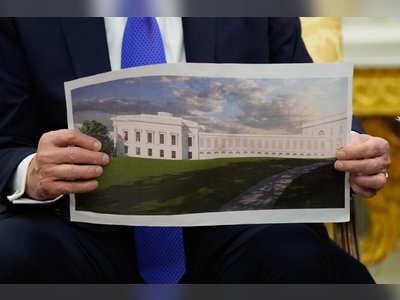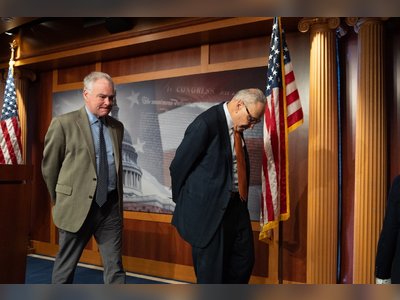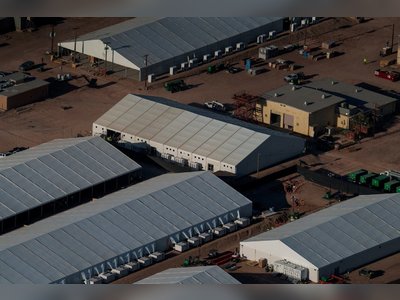TSMC Reports Soaring Profits Amid AI Surge, Navigating Geopolitical Tensions
Taiwan's Semiconductor Giant Thrives on AI Boom Despite US-China Export Restrictions
Taiwan Semiconductor Manufacturing Company (TSMC), the world's largest semiconductor manufacturer, announced a remarkable 57% surge in profits for the last quarter, driven by the burgeoning demand for artificial intelligence (AI) technologies.
The company revealed a net profit of 374.7 billion new Taiwan dollars (£9.3 billion), exceeding analysts' expectations.
This impressive growth is part of a broader trend for TSMC, which reported a 34% increase in annual revenue for 2024, totaling 2.9 trillion new Taiwan dollars (£72 billion).
Quarterly revenues for the last three months of the year rose by 38.8%, reaching 868.46 billion new Taiwan dollars (£21.6 billion).
The rise in TSMC's fortunes comes at a complex time, as the company finds itself at the center of escalating technological and trade tensions between the United States and China.
Amidst these tensions, the U.S. government announced plans to further restrict exports of AI chips to China, aiming to curb the country's access to cutting-edge technologies.
These regulations limit AI chip exports to most countries, albeit with exceptions for about 20 close allies, including Taiwan, which retain unrestricted access.
Despite these geopolitical challenges, TSMC is pursuing strategic expansion.
The company plans to establish three new factories in the United States and two additional facilities in Japan.
This move is supported by substantial subsidies from both the Japanese and U.S. governments, which aim to foster domestic chip production capabilities.
In a related development underscoring Taiwan's pivotal role in the global semiconductor supply chain, Siliconware Precision Industries Co. (SPIL), a leader in semiconductor packaging and testing, inaugurated its Tan-Ke factory in Taichung.
The event was marked by the presence of Jensen Huang, CEO and co-founder of Nvidia Corp, a California-based leader in AI chip design.
Mr. Huang's visit highlights the strong collaboration between Nvidia and Taiwanese firms in advancing AI chip manufacturing.
Huang's itinerary also included a visit to TSMC, reflecting Taiwan's centrality in the AI supply chain and emphasizing the significance of international partnerships in the semiconductor industry.
These developments underscore the ongoing strategic maneuvers by Taiwanese companies amid evolving global technological landscapes and international policies.
The company revealed a net profit of 374.7 billion new Taiwan dollars (£9.3 billion), exceeding analysts' expectations.
This impressive growth is part of a broader trend for TSMC, which reported a 34% increase in annual revenue for 2024, totaling 2.9 trillion new Taiwan dollars (£72 billion).
Quarterly revenues for the last three months of the year rose by 38.8%, reaching 868.46 billion new Taiwan dollars (£21.6 billion).
The rise in TSMC's fortunes comes at a complex time, as the company finds itself at the center of escalating technological and trade tensions between the United States and China.
Amidst these tensions, the U.S. government announced plans to further restrict exports of AI chips to China, aiming to curb the country's access to cutting-edge technologies.
These regulations limit AI chip exports to most countries, albeit with exceptions for about 20 close allies, including Taiwan, which retain unrestricted access.
Despite these geopolitical challenges, TSMC is pursuing strategic expansion.
The company plans to establish three new factories in the United States and two additional facilities in Japan.
This move is supported by substantial subsidies from both the Japanese and U.S. governments, which aim to foster domestic chip production capabilities.
In a related development underscoring Taiwan's pivotal role in the global semiconductor supply chain, Siliconware Precision Industries Co. (SPIL), a leader in semiconductor packaging and testing, inaugurated its Tan-Ke factory in Taichung.
The event was marked by the presence of Jensen Huang, CEO and co-founder of Nvidia Corp, a California-based leader in AI chip design.
Mr. Huang's visit highlights the strong collaboration between Nvidia and Taiwanese firms in advancing AI chip manufacturing.
Huang's itinerary also included a visit to TSMC, reflecting Taiwan's centrality in the AI supply chain and emphasizing the significance of international partnerships in the semiconductor industry.
These developments underscore the ongoing strategic maneuvers by Taiwanese companies amid evolving global technological landscapes and international policies.












